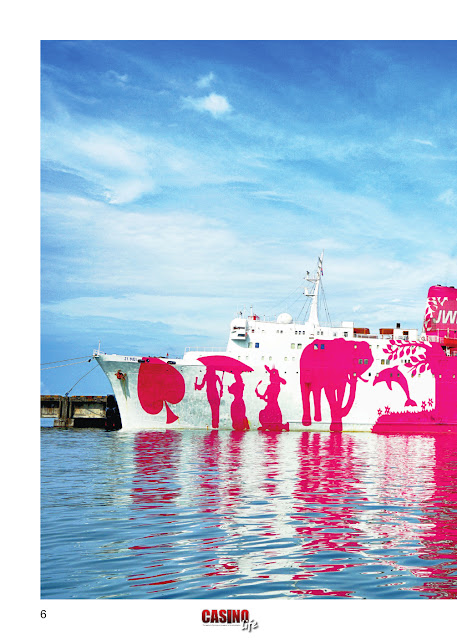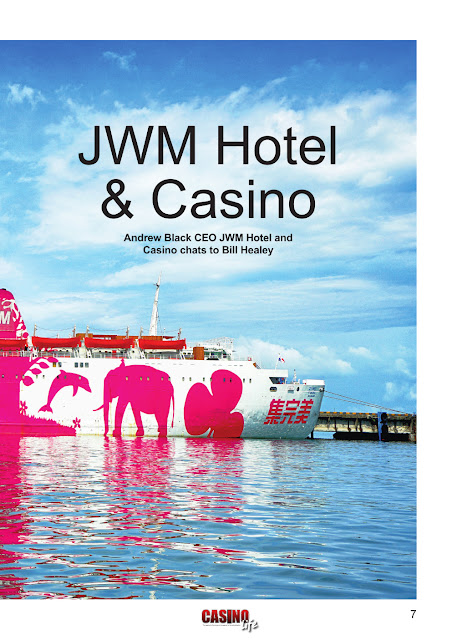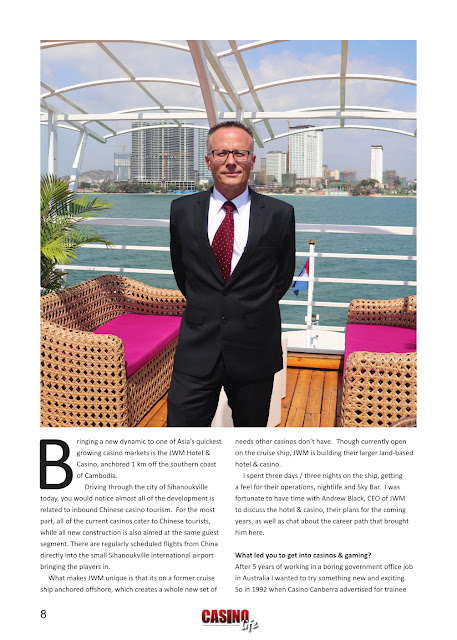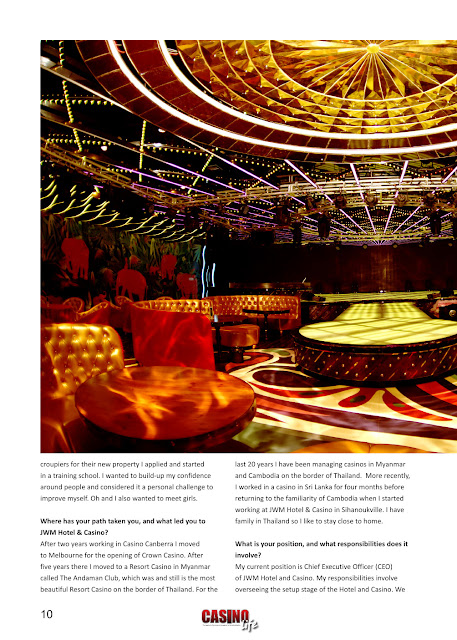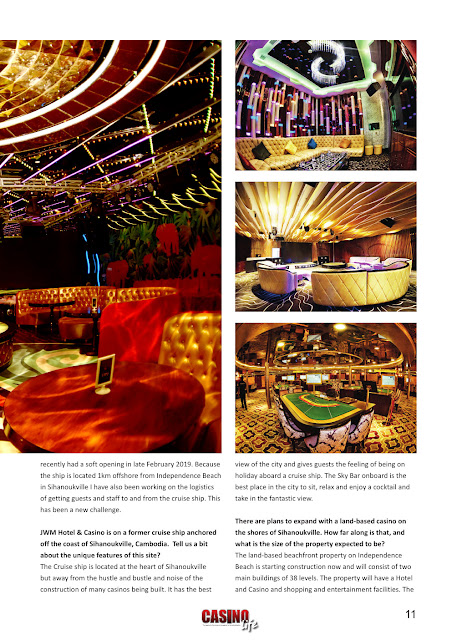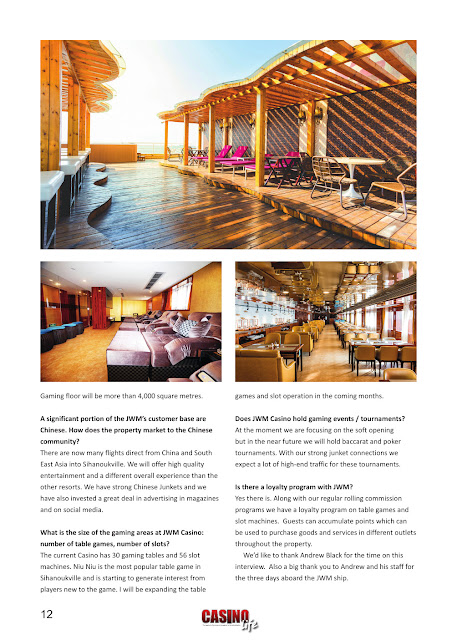from Gaming & Leisure Magazine
Spring 2019
In this issue’s International Roadtrip, I chat with Mark Fancourt about a wide range of technology topics impacting the global hospitality industry. We cover the gaps he sees in hospitality and travel technology, along with the innovations that may be on the horizon. We further discuss how startups may be set to address market needs as well as newer issues like cryptocurrences and blockchain.
 |
Gaming & Leisure Magazine
Spring 2019 |
Mark and I first met in Singapore during his time with Pan Pacific Hotels. After several years of contact in the south Pacific, we later reconnected in Las Vegas. We start our chat with a bit on Mark’s background and then take a deep dive into the status and futures of international hospitality technology.
[GL] Could you give us a bit on your background, where its taken you in the hospitality & gaming sector?
[MF] A long way! I've lived and worked in all of the three major regions of the globe. I consider myself a career hotelier who is disposed to technology, but I've retained my passion for the guest and service.
My journey began 30 years ago at hotel school in Brisbane, Australia, which started me on an operational path in food and beverage and rooms. At the time Australia was undergoing major growth in the industry as a result of international tourism and I spent the better part of ten years opening international hotels and resorts. On that journey, I came to work with a very new technology platform called Fidelio, the original version of today's Opera. I was involved in opening a six-star hotel in Brisbane in the late 80's; Butler service combines with hi-tech, 5 interfaces to the Property Management System. At that time heady stuff!
The introduction fueled my technology interest and I joined Fidelio in Australia, spending almost ten years in multiple capacities with Fidelio, becoming Micros-Fidelio and Micros over that time. I was directly involved in the launch of Fidelio's enterprise platforms for hotel groups for Central Reservations, Customers Information, Loyalty, Revenue Management and E-Commerce platforms. These products were the pre-cursor to Opera and the first Oracle based products Micros deployed. Eventually, most of the major luxury hotel management brands including, Four Seasons, Peninsula, Kempinski, and Shangri-La adopted these platforms enabling ownership of their own distribution platforms. Leading companies through the structure and design of enterprise operations on the software was a unique opportunity. The experience shifted my view of the role of technology and the necessity of an enterprise driven approach to strategy, selection, and deployment. During that period, I also graduated my Master's program in Hospitality.
I then lead a startup for enterprise financial systems for hotel companies in China, Malaysia & Thailand introducing ERP to the industry as well as consulting in the distribution space. The opportunity then arose to lead technology for Pan Pacific Hotels & Resorts, the international hospitality arm of Japanese conglomerate, Tokyu based in Singapore, where I developed and launched the company enterprise technology strategy, aligning the program throughout the company locations and properties. We merged to form Pan Pacific Hotels Group, where I took on the technology leadership of the new company and executed several enterprise platforms for the group from distribution to collaboration, service management, and finance as well as customer facing e-commerce and guest systems, moving the company into the cloud and SaaS-based technology.
The opportunity then came to join MGM and lead technology for the hospitality division, which brought me to Las Vegas. Another fantastic technology journey as the company had chosen to operate on a hospitality ERP platform for the new hotel and resort properties we were building around the world. The experience exposed me to the possibilities of a unified hospitality operational model, removing many of the traditional technology limitations in the industry. Following MGM, I moved back to vendor world as the COO of the industry software provider, Cenium.
On reflection, it's been an incredible journey. Lots of hard work and extensive travel but filled with extraordinary experiences. I've been fortunate to be mentored and supported by some great leaders and work with talented and passionate colleagues and customers throughout my career.
[GL] What are you currently involved in?
 |
| Mark Fancourt |
[MF] I have a number of adventures that I'm involved in at the moment. All largely associated with the industry and a technology lean.
Along with Cheyne Cole, my co-founder, we launched a non-profit, Testbed.Vegas, which is focused on bringing attention to the industry technology community in Las Vegas. Our goal is to see Las Vegas become one of the leading locations for the development of technology for the travel & hospitality industry. Such an industry has a natural fit with the largest consolidated travel destination in the world and would be a valuable and appropriate addition to industry in Las Vegas.
Cheyne and I also founded TRAVHOTECH, which is a technology consultancy focused on the travel and hospitality industry. We have products for operators and the vendor community and are leveraging our backgrounds in travel and hospitality technology around the world for our customers. As we've both had operator and vendor leadership experience and worked and lived in different cultures around the world, we feel we have a unique perspective to offer the industry.
We also launched the local community for Travel Massive, which is a global community of travel professionals founded by a fellow Australian, Ian Cummings. With travel being a major contributor to employment and GDP in Las Vegas, eventually, Travel Massive Las Vegas should be one of the largest global chapters of industry professionals.
Cheyne and I also have a product development company, Ready Travel Brands, which is a technology development vehicle for ideas we have for travel products. Our first product being Farestar.com.
On a personal note, I was recently appointed to the board of Hospitality Financial & Technology Professionals (HFTP). HFTP represents industry finance and technology persons around the world and is focused on the education and development of the membership and industry in general. It's also the producer of HITEC - the main hospitality industry technology trade show in the USA and in other global locations.
In my spare time I started a social community, Loz Vegas, intended to be the community for Australian's working and living in Las Vegas.
Plenty to keep me busy across a diverse range of topics.
[GL] What type of gaps are there in hospitality & travel technology?
[MF] There are always opportunities for emerging or niche function technology solutions across the industry. For many years this has been the method of product introduction and eventual adoption of new to market technology.
Although, what has always been distinctly noticeable to me is a couple of major gaps. The first being integration. When I say integration, I mean this from the perspective of singular software platforms serving multiple aspects of the operation. We've had interfaces for decades. There's nothing new about that. Currently, several companies are addressing Service Bus approaches to interfacing, which is a positive improvement as a technical model, and also more efficient, avoiding legacy repeated effort to connect disparate systems. Las Vegas has a long history with this technology as well. Although, it is still just a process of connecting disparate systems.
After so many decades of technology-driven development and operations for the industry, it's hard to fathom how the technology platforms have generally not broadened to cover more aspects of the operation in a single platform. Other industries are well ahead in terms of across business software platforms. When we look at the major challenges that face industry; staffing, retention, complexity, harnessing, and usage of data, operational optimization, they all point to a streamlined operational platform.
My view is that the industry has often been guilty of chasing the 'shiny object' in relation to technology acquisition and investment. What's the latest fad in 'guest-facing technology'? And yet the majority of the technology used in the industry is used by the operation of the business. For me, it's a question of substance over style. Choosing substantive technology investments is a tougher road for organizations to take from the change management perspective. However, the rewards are greater. It's unrealistic for the industry to keep pace with consumer technology investment. Much more manageable to seek continuous operational improvement through the pursuit of technology platforms that bring a competitive advantage to the business.
Both are important, and balance is required. I would like to see the balance shift toward improving the operation through technology. Happy staff, happy guest is one of my mottos.
[GL] What do you see as the major technical innovations coming to the hospitality industry?
[MF] The opportunities for continued improvement through technology are rife for the industry. The pace of technological change and the changing expectations of the customer are demonstrating large gaps in the technical and operational capabilities.
For many years multiple facets of hospitality operations have been able to survive largely without technology to improve business processes. With information or data now being the new 'currency', the smart players are realizing that major changes must take place to capture and maintain customer relationships. Concepts or buzzwords like 'personalization' and 'guest experience' are great rallying cries. Although the reality is that many operational functions are not at the point of basic data capture. Personalization is a long way down the road for most operators. The journey has to start somewhere.
Food and Beverage operations is a great example. A high-profile aspect of hospitality operations globally and yet in many restaurants and outlets there is no standard process of customer information capture or even a formal reservation. It is curious that having mastered the science of room bookings, the learning has been slow to shift over to other space and inventory operations.
In the back of the house streamlining of supply chain processes has only one way to go - up. So much operational cost is involved in purchasing, storage, manufacture, and service of food and beverage products, and yet it is highly disconnected, in many cases, a manual operational process. There is much money to be made and saved in this space through smart application of technology.
Another area that is not new, although through continued technical development, is increasingly game-changing, is the combination of converged networking and networked services. That all sounds very technical, but in layman's terms is the ability to consolidate business utility through a single infrastructure environment. As a practical example in the time I've been involved in industry technology we started with four separate 'network' environments in a building. One for data, TV, voice, and audio. Sometimes these were separate for operations and guest services. With today's technology, the point has been reached where a single network can deliver all these services. The positive commercial implications for construction are significant, not to mention the operational possibilities. The complementing factor that electricity can be delivered across the same environment is a massive bonus and another major cost saver.
The result for hospitality buildings with significant built environments and infrastructure are tremendous. Connected systems with real-time monitoring on commercial grade infrastructure will result in improved reliability and smart connected systems with preventative maintenance being in an aware state. Asset owners and operators will be far more proactive in extending the life of equipment in such an environment. The guest will win.
Even more exciting and leveraged from the same infrastructure is the continued improvement to built environment technology and energy or green management. Hotels are incredibly wasteful in the use of utilities. Power and Water are massive contributors to operational cost and poor management in a technical world is not environmentally focused. Earlier in my career, I was involved in the early adoption of aware energy management technology. At the time we found that with the combination of technology we were able to save as much as 35% in energy consumption in the guest room with the subsequent reduction in operational costs. The technology has improved remarkably since then.
Another major emerging area for technology is the lifestyle space. By lifestyle, I am referring to the other revenue opportunities found in the hospitality environment aside from guest rooms and meeting spaces. Sometimes referred to as ancillary revenue. In today's environment operators are not able to harness these products and services into a single selling platform. The end result is that these products are not sold or have to rely on last-minute sales opportunities. Each function tends to operate as a stand-alone environment, which may or may not be supported by a technology platform. The ongoing result is that the perishable inventory perishes.
The basic concept of distribution determines that the industry needs to systemize and distribute these products internally and ultimately externally to increase sales opportunity. Las Vegas has led the way based upon their understanding of the importance of lifestyle and entertainment revenue streams. Consolidation and presentation of most of their products and services to their internal staff and in a guest-facing capacity has been achieved on the back of significant technology investment outside the capacity of the mainstream hospitality operation. There is much to be learned from their experiences and significant opportunities for revenue growth.
The optimization and automation of service processes, again, while not new, still has a long way to go in across industry adoption. Such an initiative includes the mobilization of the workforce to achieve a connected state. For an industry whose guest satisfaction is based upon service, it's is natural that one of the core systems would be an across business service management environment. Smart operators can leverage other technologies to revise job roles and improve the speed and consistency of service.
The next phase for early adopters will be the continued optimization of human resources and location-based service delivery. The best hotels in the world tend to have a commonality of excellent service. In my experience, there is a direct correlation between a mobile workforce and customer satisfaction. In an online world where customer sentiment, positive or negative, is the click of a mouse or the touch of a button away, it should not require too much incentive for industry operators and asset owners to make such an investment.
Most of these technology opportunities are not guest facing. Technology can be implemented, improving the operation of the business with limited direct impact on guest behavior.
[GL] How will blockchain & cryptocurrencies be accepted in the near term, and longer term?
[MF] Definitely an interesting space for the industry and as a technology in general. Personally, I tend to separate the two topics.
From a Cryptocurrency perspective, at the moment there seems to be a marketing advantage to being associated with the acceptance of Cryptocurrency.
Over time the various currencies will establish greater legitimacy and a level of acceptance and trust, which I believe is the most important factor for adoption. In that process, there will be a consolidation of the various currencies and eventually, a handful will become the mainstream. If the stability and trust are established broader scale adoption will become the mainstream across any industry. However, I do believe there are other macro-level infrastructure and governance developments well outside of this industry that will need to take place to see mainstream adoption.
On the topic of Blockchain, again there will need to be some macro-level developments outside of our industry. My view is that Blockchain is a system or technology-driven initiative. As a general rule introduction to the industry will be via companies that provide technology to industry, and whether that technology incorporates Blockchain logic as a method of recording financial transactions. Much time and effort are being dedicated to finding the right type of industrial processes that might be suited to the methodology of Blockchain. The two that I believe are of interest is the distribution environment and the supply chain environment.
Simplification of the distribution model is naturally a hot topic for an industry with such a complex marketplace and it's easy to understand why various parties are engaging in the debate and even early adoption. The opportunity to simplify the model is positive for the supplier and the guest. The ability to remove necessary or unnecessary entities from the process will provide greater transparency to the customer and the supplier. Subsequently, cost should be removed from the process improving financial performance, and I would like to believe, the standard of product and service for the guest.
At this stage, I'm not convinced Blockchain addresses distribution and search from the current marketplace behavior as it stands today. The majority of travelers' book through third parties whether that be direct bookings as OTA's or corporate travel providers, providing a major market share to the industry. Aside from the Blockchain model or opportunity, it is a challenge for the industry to convert the guest to booking directly with the provider. Short of removing the middlemen from the distribution process by individual properties or management groups in the contracting and distribution environment, the education of the customer will continue to be driven by the provider. I believe addressing the inequity of Rate Parity will have a greater impact on the balance of the distribution environment. In conjunction with each other, the model could be very interesting.
Conversely, the current distribution players and middlemen can also adopt Blockchain. There are entities involved in the distribution chain that do provide genuine product and service to the eco-system beyond a simple cut of revenue. Ultimately the value these products and services provide will determine their place in the supply chain, beyond Blockchain. Perhaps it will streamline the model and the players involved.
The supply chain approach also looks to have promise from speed to market, food security, quality, and tracking perspective. Supply chain processes are generally more tightly linked to the financial process in the industry as a result of the purchasing and procurement process and seem a good target for adoption. The opportunity to source more local produce and eliminate the cost of production, transportation and other logistics seems much more realistic in application. Although dependent upon product and location the spread of options or opportunity may be more limited.
Another interesting application of Blockchain that I have noted is the process of flight disruption and remuneration to the traveler. A process that currently takes weeks and a great deal of pain primarily for the customer can be streamlined to a real-time settlement with the passenger.
Closer to home the application of Blockchain technology to the gaming environment is also interesting. I've been involved in discussions regarding private Blockchain environments and optimizing the processes involved in remuneration of the player. Consider the many financial processes involved in markers, ticket-in-ticket-out, cashiering and return of winnings to the player. There could be some positive upside to the player experience and ease of tracking and movement of funds through the various stages.
Outside of the customer and supplier facing processes the opportunity for financial process streamlining and swift movement of funds through the concept of trusted providers and contracting has the opportunity to remove overhead from the overall business process.
It's still early days as a concept and a technology. Over time practical methods for application will be found. Although in an industry where technology platforms are vendor driven the capacity to support the functionality will be led by the vendor community.
[GL] How is the current market for technology startups in hospitality?
[MF] Vibrant is the word I would use. There is no shortage of companies entering the market with ideas for technology that they believe could change or improve the way the business runs.
The ongoing trend is guest facing solutions that could positively impact or smooth the experience. We observe that the solutions tend to be niche or addressing a narrow functional area of the overall hospitality operation. The other factor we have found peculiar is many of the ideas come from persons not from industry but saw a problem or a challenge from the guest perspective.
It's easy to forget that most people only experience hospitality from the guest perspective and that the business processes involved in making a small town or city operate, as I refer to hotels and resorts, is not widely understood. As a result, we see fewer solutions that are oriented towards the operation as that requires internal knowledge.
Europe is a powerhouse of new ideas and technology solutions for the industry. The market there is more diverse from a customer base than North America and we see products being built for different layers of the market. For example, there are perhaps five new Property Management Systems being delivered out of Europe at the moment that addresses many layers of the physical hospitality product.
I touched on the lifestyle space earlier in our discussion and there is a mass of technology coming into this market space, which is across industry sub-sectors related to booking lifestyle experiences. Perhaps Hotel Booking Engine part two could be an apt description. This space has far less structure to the movement and storage of inventory and pricing. Eventually, consolidation will determine a standard for data movement.
One of the motivations behind Testbed.Vegas is to see companies choosing Las Vegas as a headquarters for their industry technology. In Las Vegas, we have the relevant audience for new technology companies aiming to solve industry challenges at scale. If you can build for the scale of Las Vegas, then your product will work anywhere.
[GL] Where do you see the differences between gaming hospitality and hospitality?
[MF] There are definite differences even though at the macro level it is the same industry. Having worked in what I would call both sub-sectors of the industry provided the opportunity to appreciate the differences.
Property scale is naturally something that distinguishes the Hospitality & Gaming sector from Hospitality. That is one obvious difference, although it's not necessarily what I believe drives the difference. They have two very different financial models and revenue streams. There are similarities in the type of products but the motivations for the business come from different perspectives. It's not that long ago that the hotel operations side of the Las Vegas business model was in essence, provided to the player. Today players still have opportunity to enjoy the hotel operations experience at low cost or free of charge in return for their gaming custom and total customer value. I think it is also fair to say that the Hospitality & Gaming sector is an entertainment-driven business. That's a broad word, but in reality, the guest coming to Las Vegas is anticipating a destination experience where entertainment is a big part of the overall spend. Hopefully on the same resort or at least a sister property. This has also driven some of the technology innovation that these companies have brought to their business.
The shift in the Las Vegas model to robust revenue streams across the entire business is an amazing case study in understanding market sentiment and opportunity.
Hospitality is an accommodation driven business model. It is also a highly crowded and competitive market in any developed location around the world. There are only so many gaming properties. There are 1000 hotels in the greater London metropolitan area.
Ownership structure also plays a significant part with most Gaming properties owner-operated, whereas many hotels and resorts have a third-party owners or are managed.
It is very interesting to watch both sub-sectors of the industry bring the strengths of the other to their offering. I touched earlier on the gaming companies understanding of lifestyle operations and presenting a consolidated platform for the purchase of all products and services. The hospitality sector can learn a lot from this. Conversely, the gaming companies are looking to improve the hospitality and hotel operation sides of their business as an improved experience for the guest, which has always been the singular focus and revenue stream for the hospitality sector.
[GL] What do you forecast in the future that will have a major impact on the industry from a technical perspective?
[MF] We still have so far to go with the optimization of the industry using the foundation of technology. The good news is that a broad range of solutions exist in the market to achieve the outcomes today as operators.
The major change I believe will shake the industry is the rise of Google in the vertical. Google’s product set for the travel and hospitality experiences is already an incredibly powerful platform for the commercialization of the traveler. When Google adds the capability of booking to their portfolio this will turn the industry on its ear. There will be ramifications across the entire sector, and supply chain, although this may present the hospitality industry with another opportunity to seize control of their products and pricing.
Perhaps not the customer relationship. My view is that consolidation of information in above industry platforms is drawing the direct customer interaction toward to the top of the supply chain, based upon the consolidation of and access to information. Business will have to find improved ways to maintain a level of brand connection with the guest while they shop in consolidated information market places, not just for travel products, but all products they need in their lives.
Gaming & Leisure Magazine would like to thank Mark Fancourt for his time and valuable contribution to this issue’s International Roadtrip.

 [CL] JWM Hotel & Casino is on a former cruise ship anchored off the coast of Sihanoukville, Cambodia. Tell us a bit about the unique features of this site?
[CL] JWM Hotel & Casino is on a former cruise ship anchored off the coast of Sihanoukville, Cambodia. Tell us a bit about the unique features of this site?

